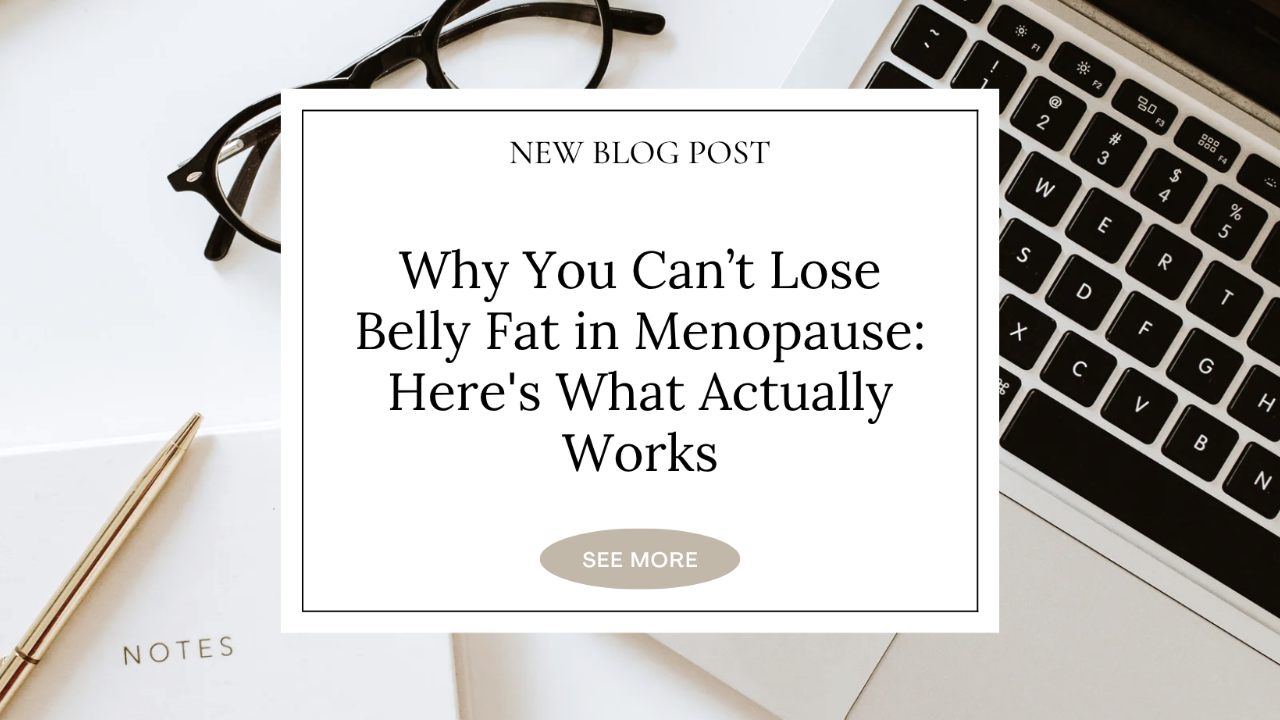Why You Can’t Lose Belly Fat in Menopause: Here's What Actually Works
Nov 13, 2025
Why You Can’t Lose Belly Fat in Menopause: Here’s What Actually Works
Let’s be honest — few things feel more frustrating than watching your body change while you’re doing everything right.
You’re eating well. You’re exercising. You’re sleeping as best you can.
And yet, that stubborn belly fat won’t budge.
You start to wonder — is this just my age? my hormones? my willpower?
Here’s the truth: what’s happening isn’t failure.
It’s physiology.
The Hormonal Shift You Can’t Outrun
During perimenopause and menopause, oestrogen — once your metabolic ally — starts to decline.
Oestrogen plays a major role in fat distribution, glucose control, and muscle maintenance. When it falls, fat storage tends to shift from hips and thighs to the abdominal area, leading to that classic midsection change so many women notice.
Why?
Because your body is adapting.
Fat tissue can produce small amounts of oestrogen — so when ovarian levels drop, your body often protectively stores more around the abdomen.
It’s not betrayal. It’s biology trying to keep you safe.
The Cortisol Connection
Now add stress.
Chronic stress elevates cortisol, a hormone designed to help you survive short-term challenges — but when it’s constantly high, it promotes fat storage, especially in the abdominal region.
This isn’t random. Cortisol receptors are densely concentrated around the visceral area, meaning your body is more likely to store energy there in stressful or low-energy states.
It’s a survival response — not a character flaw.
Sleep disruption, overtraining, under-eating, or skipping meals (sound familiar?) all elevate cortisol.
And when cortisol’s up, your body isn’t interested in burning fat — it’s trying to conserve it.
Muscle, Metabolism, and Menopause
Another key player?
Sarcopenia — the natural loss of muscle mass that accelerates with age and declining oestrogen.
Less muscle means fewer mitochondria (your cellular energy factories) and a lower resting metabolic rate.
You can’t “hack” this with more cardio or eating less.
In fact, restrictive dieting only worsens the issue by breaking down muscle and slowing metabolism further.
Instead, focus on:
-
Progressive strength training (at least 2–3 times weekly)
-
Protein intake of 1.6–2g/kg body weight daily
-
Prioritising recovery and sleep as non-negotiables
Why the Calorie Deficit Alone Isn’t Working
A calorie deficit works — in theory.
But in menopause, the system those calories interact with has changed.
When hormones like oestrogen, progesterone, thyroid, and cortisol are dysregulated, the body becomes less responsive to restriction.
You may create a deficit — but your body compensates by reducing energy expenditure, increasing hunger signals, and altering thyroid output.
It’s not that your metabolism is “broken.”
It’s adaptive.
Your body is intelligent — it just needs safety before it allows change.
What Actually Works
-
Eat enough — especially protein and whole-food carbohydrates.
Undereating is one of the biggest reasons women can’t lose fat in midlife. Balance blood sugar, don’t crash it. -
Lift weights with intention.
Muscle is metabolic medicine. Build it, and you’ll naturally improve insulin sensitivity and energy balance. -
Lower your stress load — not just your calories.
Yoga, walking, journalling, breathwork, therapy — they’re not “extras.” They’re fat-loss tools through the cortisol pathway. -
Support your sleep and circadian rhythm.
Go to bed at a consistent time. Limit late caffeine. Dim light exposure after sunset. -
Track progress beyond the scale.
Use strength, energy, digestion, cycle symptoms, and mood as markers of success — because body composition follows health, not the other way around.
You Don’t Need to Punish Your Body — You Need to Partner With It
Menopause is not a metabolic death sentence.
It’s an invitation — to understand your physiology on a deeper level, and to work with it rather than against it.
When you shift from control to collaboration, everything changes — your energy, your body, your peace of mind.
Ready to Rebuild Your Hormonal Health?
If you’re tired of doing everything right and still feeling stuck, it’s time to work smarter — not smaller.
My 12-Week Hormone Coaching Container is designed to help women in perimenopause and menopause optimise metabolism, manage symptoms, and reconnect to their bodies with confidence.
It includes:
-
Personalised nutrition and lifestyle strategy
-
Hormone and blood work guidance
-
Education around metabolism, stress, and female physiology
-
Accountability and compassionate coaching
Because sustainable change isn’t about restriction — it’s about regulation.
👉 Apply now to start your 12-week transformation. Just email [email protected] "menopause"
Your hormones aren’t holding you back — they’re just asking to be heard.
Consider 1:1 Nutrition Coaching with me now to unlock your full potential
Stay connected with news and updates!
Join my mailing list to receive the latest news and updates.
Don't worry, I hate spam too.
I hate SPAM. I will never sell your information, for any reason.

